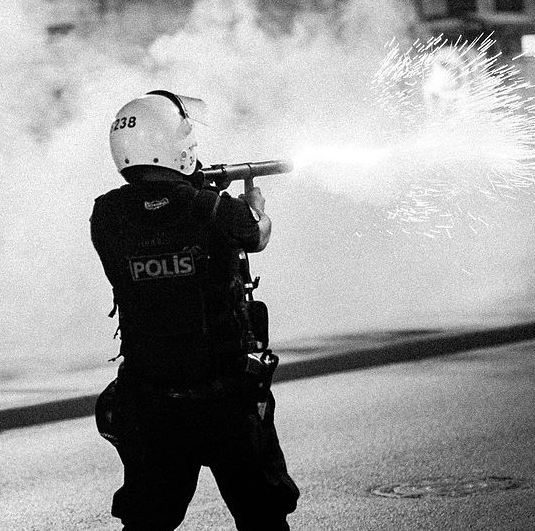
Photo via Wikimedia Commons
“Among journalists, the truth universally acknowledged is that bad news commands more column inches than good,” stated by the Turkish journalist Yavuz Baydar on 20 March to the Guardian. “In Turkey, the even more depressing truism is that much of the bad news has to do with the news industry itself.”
In recent weeks, the Turkish parliament has been debating a reform package of internal security promoted by the government. It is a document of 12,000 words that threatens to undermine the strong civil liberties of the Turks. From terrorism to the fight against crime, from the local administration to the reorganization of the police force. The reform, strongly supported by Prime Minister Erdogan and his party (AKP), will be approved before the June elections and threatens to tighten even further free expression and news in the country.
The researcher Efe Kerem Sozeri explained well to Medium, with explanatory cartoons, what could be the practical effects of this reform. Indiscriminate preventive detentions, surveillance and intercepts without the supervision of a court in charge, the use of violence as a pretext by law enforcement, the arrest of those who protest or obscure even only half their face during demonstrations. It is something very similar to a police state.
“Freedom of information is threatened by this bill, which reduces judicial control of the police even further,” said Johann Bihr, the head of the Reporters Without Borders Eastern Europe and Central Asia desk. “Journalists are already permanently exposed to police abuses that should be prevented and penalized, not encouraged.”
For some time, press freedom in Turkey has not been in good shape, causing the concern of the major world organizations that deal with human rights and press freedom.
Last December, at the culmination of a series of operations aimed at weakening the criticism towards government and hit opponents (including part of the judiciary and police), 27 journalists, known for their very critical positions on the Turkish president, were arrested on charges of conspiring together with imam Fethullah Gülen to overthrow the current government. Among those arrested were also Ekrem Dumanli, editor of the country’s main newspaper, Zaman, and Hidayet Karaca, head of Samanyolu broadcasting, considered very close to the cleric, a sworn enemy of Recep Tayyip Erdogan.
In the same period, the journalist Sedef Kabas was arrested for having accused, on Twitter, Judge Hadi Salihoğlu of dropping the investigation opened against the sons and daughters of some ministers of Erdoğan’s government.
According to the 2014 report of the Independent Communication Network (BIA) there are 22 journalists currently detained, and more than 61 journalists accused of defamation against Erdoğan in the last three years. Today, the index on press freedom by Reporters Without Borders ranks Turkey to 154th place out of 180, while Freedom House, an organization that monitors the freedom of the press in the world, downgraded the country from “partly free” to “not free” in its latest 2014 report.
“Turkey’s status declined… as a result of sharp deterioration in the press freedom environment in 2013,” the organization explained. “Journalists were harassed or assaulted when attempting to cover the Gezi Park protests that broke out in Istanbul in May, and dozens were fired or forced to resign in response to their reporting on the demonstrations.”
In such a problematic scenario for news, independent online media and social networks have tried to fill this deep democratic chasm. However, the government has promptly limited this threat by blocking the access to platforms such as Twitter and YouTube. According to the biennial report on transparency, published by Twitter in early 2015, which informs about requests for information and cancellation received by governments about accounts and content, the Turkish government is the one which filed more requests to remove content, between July and December of last year (477), five times more than any other country (Russia 91, Germany 43). Compared with the January-June period requests increased by 40%.
The pressures of government, politics and law enforcement are not the only form of intimidation to free expression in the country. The threat of dismissal and forced resignation acts as a powerful weapon of deterrence and self-censorship, often accompanied by an unfavorable environment for independent and free media, forced to work in a corrupt economic system that rewards powerful press organizations that benefit from the complacency and the favors of the senior state echelons.
P24 is an NGO that monitors and promotes freedom of action and thought in the Turkish media, supporting independence, production and training. Yavuz Baydar and Andrew Finkel are the two co-founders. The first has been a commentator of Zaman for 35 years, writing about domestic and foreign policy and collaborating with the New York Times, the Guardian, Süddeutsche Zeitung, El Pais, Al Jazeera. Finkel participated in the mission of Freedom House on press freedom in Turkey in 2013, and worked as a correspondent for the Daily Telegraph, Times, Economist, Time Magazine and CNN.
Yavuz Baydar and Andrew Finkel will be guests of the International Journalism Festival to discuss the state of journalism in Turkey, at the event “Turkey: a media under siege,” on Saturday, 18 April at 14.30 at Palazzo Sorbello. Also dedicated to Turkey is the presentation “Turkey’s war on Twitter,”with Efe Sozeri, researcher of the University of Amsterdam and expert on issues of press freedom and censorship in Turkey, and Marina Petrillo, journalist of Reported.ly.


